The Samsung 980 PRO PCIe 4.0 SSD Review: A Spirit of Hope
by Billy Tallis on September 22, 2020 11:20 AM ESTNote: All our previous testing has been on an Intel test bed. Because of the move to PCIe 4.0, we have upgraded to Ryzen. Devices tested under Ryzen in time for this review are identified in the charts.
Sequential Read Performance
Our first test of sequential read performance uses short bursts of 128MB, issued as 128kB operations with no queuing. The test averages performance across eight bursts for a total of 1GB of data transferred from a drive containing 16GB of data. Between each burst the drive is given enough idle time to keep the overall duty cycle at 20%.
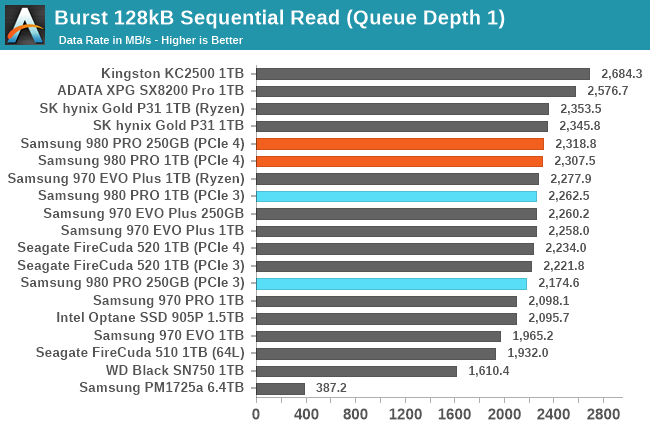
The burst sequential read performance of the Samsung 980 PRO is marginally faster than its predecessors, but the extra PCIe Gen4 bandwidth doesn't matter with a queue depth of just one. The drives using the SM2262EN controller stay on the top of this chart.
Our test of sustained sequential reads uses queue depths from 1 to 32, with the performance and power scores computed as the average of QD1, QD2 and QD4. Each queue depth is tested for up to one minute or 32GB transferred, from a drive containing 64GB of data. This test is run twice: once with the drive prepared by sequentially writing the test data, and again after the random write test has mixed things up, causing fragmentation inside the SSD that isn't visible to the OS. These two scores represent the two extremes of how the drive would perform under real-world usage, where wear leveling and modifications to some existing data will create some internal fragmentation that degrades performance, but usually not to the extent shown here.
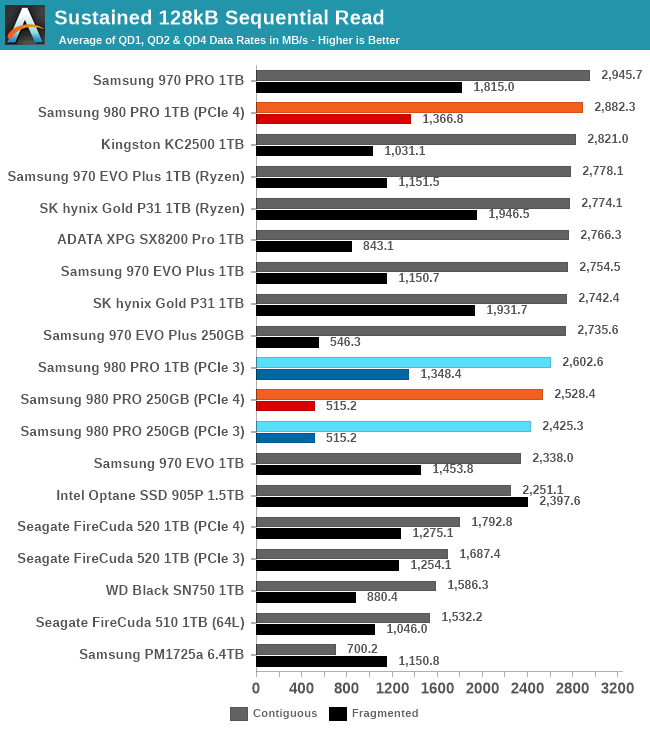
On the longer sequential read test, the 980 PRO no longer has a clear advantage over its predecessors. The 250GB 980 PRO is slightly slower than the 970 EVO Plus even on our new testbed. The 1TB 980 PRO shows slight improvement in its performance reading back data that wasn't written sequentially, but the 970 PRO and the SK hynix Gold P31 are still significantly faster for that task.
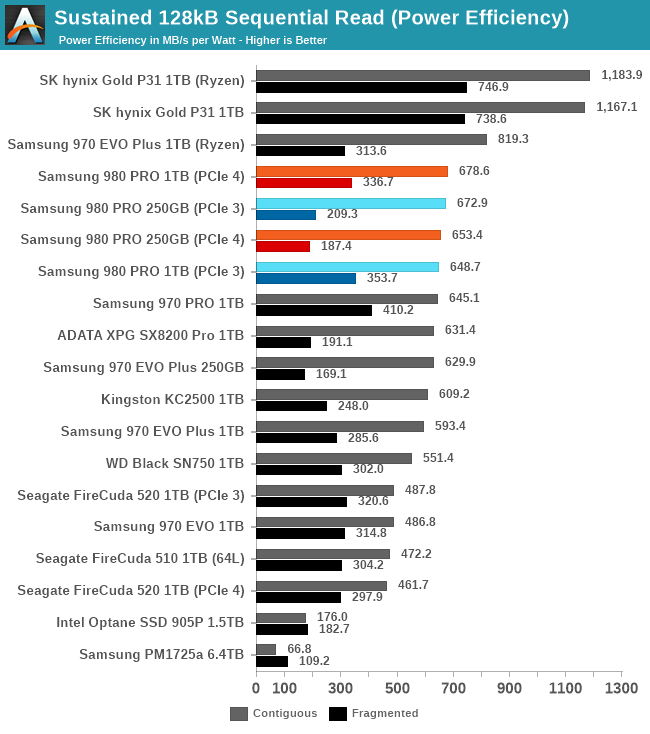 |
|||||||||
| Power Efficiency in MB/s/W | Average Power in W | ||||||||
The power efficiency scores for the 980 PRO on the sequential read test are a mixed bag. Overall, the scores are still good for a high-end NVMe drive, but it doesn't consistently improve over its predecessors, and when it does score better the improvement is small.
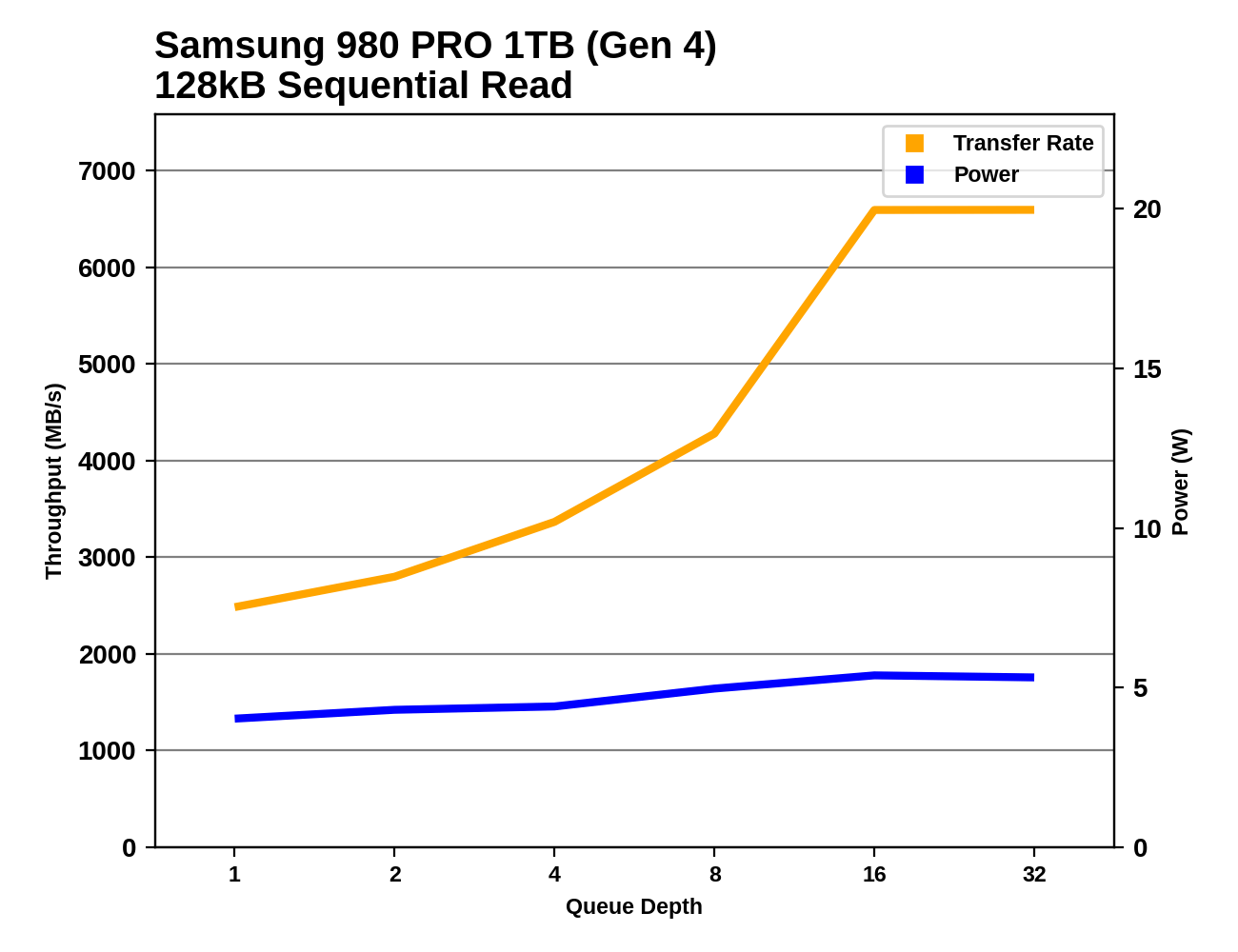 |
|||||||||
The 980 PRO's sequential read performance doesn't saturate until around QD16: rather late in the test compared to most drives, but that's because high-end PCIe Gen3 drives have been hitting the host bandwidth limit at moderate queue depths. The 1TB 980 PRO does show decent performance scaling through the lower queue depths, taking it past the PCIe Gen3 limits by QD8. This is a clear improvement over the Phison E16-based Seagate FireCuda 520, which doesn't start gaining speed until after QD4.
The 250GB 980 PRO falters midway through the sequential read test, with performance dropping at QD4 and QD8, on both of our testbeds. At QD16 and higher it's still well above the PCIe Gen3 speed limit, but at lower queue depths it isn't an improvement over the 970 EVO Plus.
The sequential read performance of the 980 PRO—with sufficiently high queue depths—goes far beyond what's possible with PCIe Gen3, and the 1TB model stands out dramatically as significantly faster than even the Phison E16 drive. The E16 looks like an extrapolation of the high side of the general power/performance curve, but the 980 PRO blows past 6GB/s with power draw that would still be reasonable at half the speed.
Sequential Write Performance
Our test of sequential write burst performance is structured identically to the sequential read burst performance test save for the direction of the data transfer. Each burst writes 128MB as 128kB operations issued at QD1, for a total of 1GB of data written to a drive containing 16GB of data.
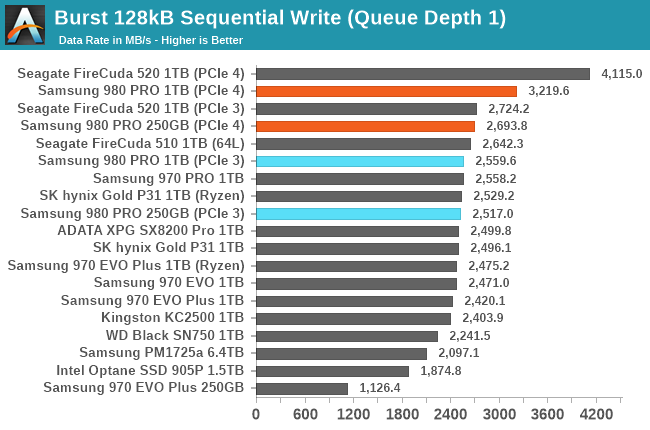
The burst sequential write speed scores for high-end NVMe drives have been fairly boring, with a narrow spread of scores for a wide variety of drives. The PCIe Gen4 drives break out of that rut and deliver real improvement to this QD1 performance, but the Phison E16-based Seagate FireCuda 520 is well ahead of the Samsung 980 PRO on this test.
Our test of sustained sequential writes is structured identically to our sustained sequential read test, save for the direction of the data transfers. Queue depths range from 1 to 32 and each queue depth is tested for up to one minute or 32GB, followed by up to one minute of idle time for the drive to cool off and perform garbage collection. The test is confined to a 64GB span of the drive.
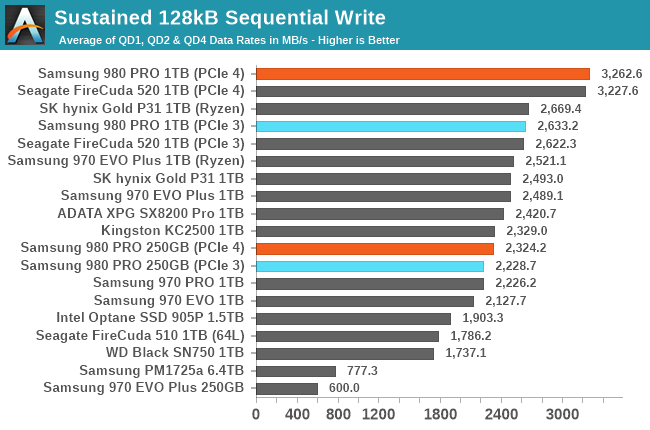
On the longer sequential write test that includes low to moderate queue depths, the 980 PRO and the Phison E16 drive end up roughly tied, with the 980 PRO only 1% ahead overall. The smaller 250GB 980 PRO is a bit on the slow side compared to most of the 1TB drives, but it's several times faster than the 250GB 970 EVO Plus thanks to the larger SLC cache.
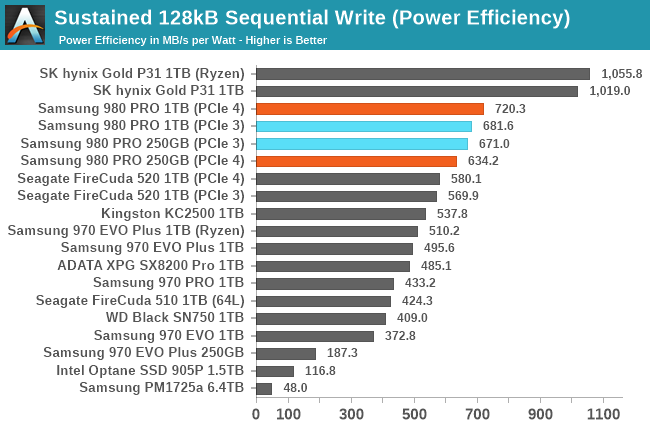 |
|||||||||
| Power Efficiency in MB/s/W | Average Power in W | ||||||||
Since the 980 PROs are able to make good use of their high performance on this test, it's not too surprising that they post good efficiency scores for sequential writes. But even when tested on a PCIe Gen3 system the 980 PROs remain significantly more efficient than the 8-channel Gen3 drives, so the 980 PROs are also doing a good job of scaling down power consumption at lower speeds.
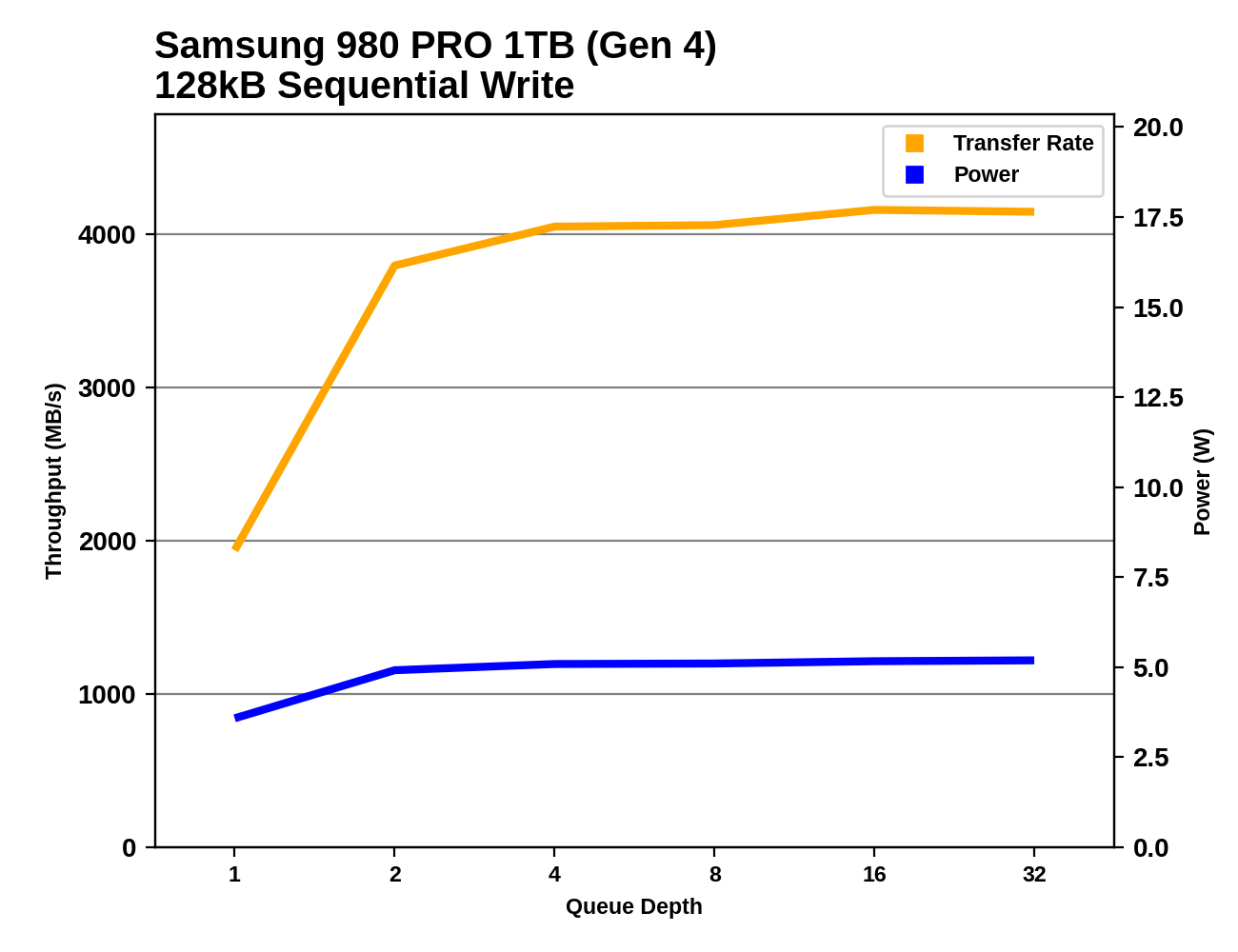 |
|||||||||
At QD2 the 1TB 980 PRO's sequential write speed is already well above the practical limit for PCIe Gen3, but further increases in queue depth don't bring much more performance. The 980 PRO is generally a bit faster and more consistent than the Seagate FireCuda 520 on this test. The 250GB 980 PRO doesn't see any benefit from PCIe Gen4 execpt at QD1, because its SLC cache write speed doesn't come close to the PCIe Gen3 limit. Unlike the random write test, the 250GB 980 PRO makes it all the way through the sequential write test without running out of cache or experiencing a performance drop.
The two 1TB PCIe Gen4 drives extend the same power/performance trend set by most of the high-end Gen3 NVMe SSDs. The 980 PRO falls toward the more efficient side of that trend while the Phison E16-based Seagate drive is more power hungry and approaches the reasonable limits for M.2 drives.


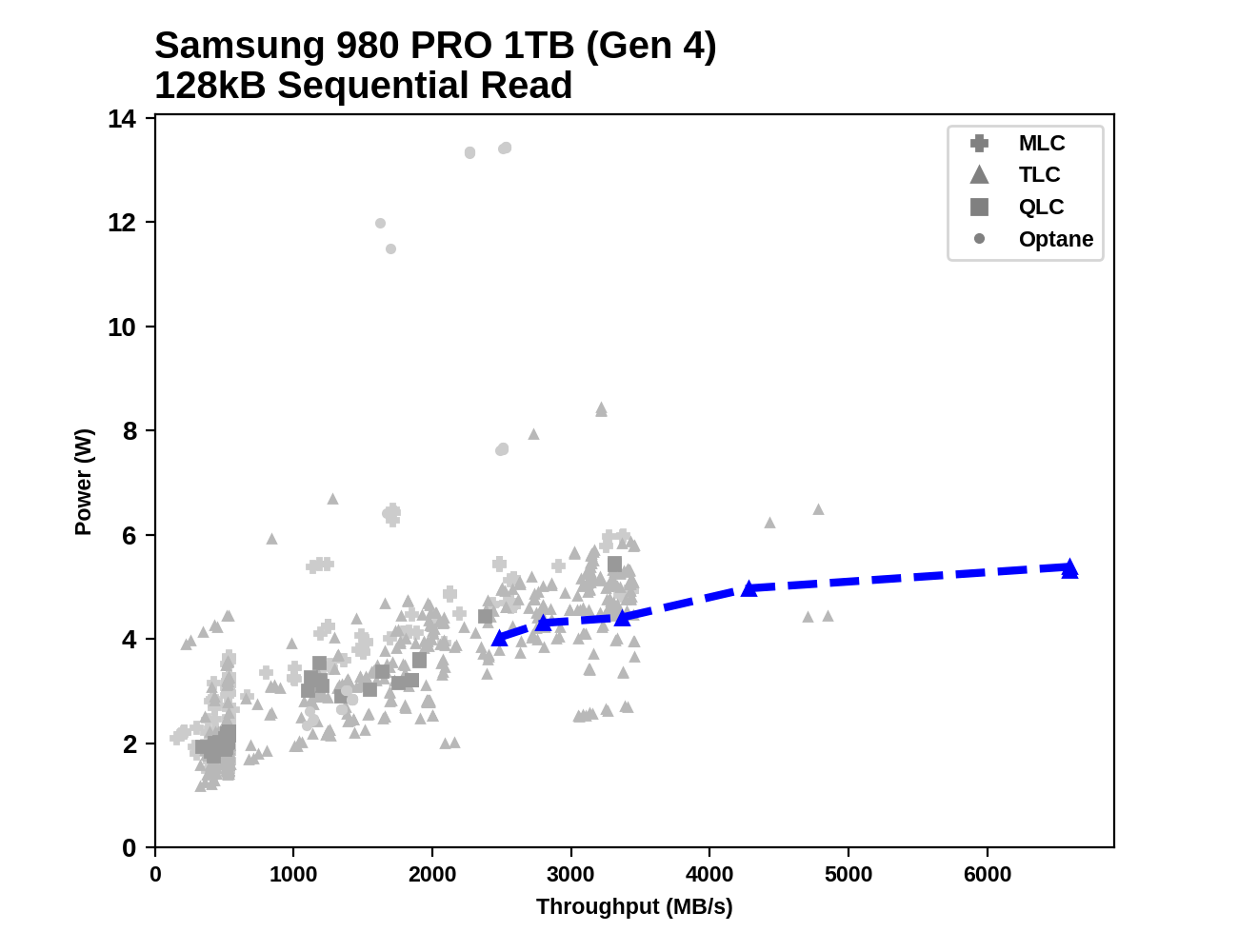
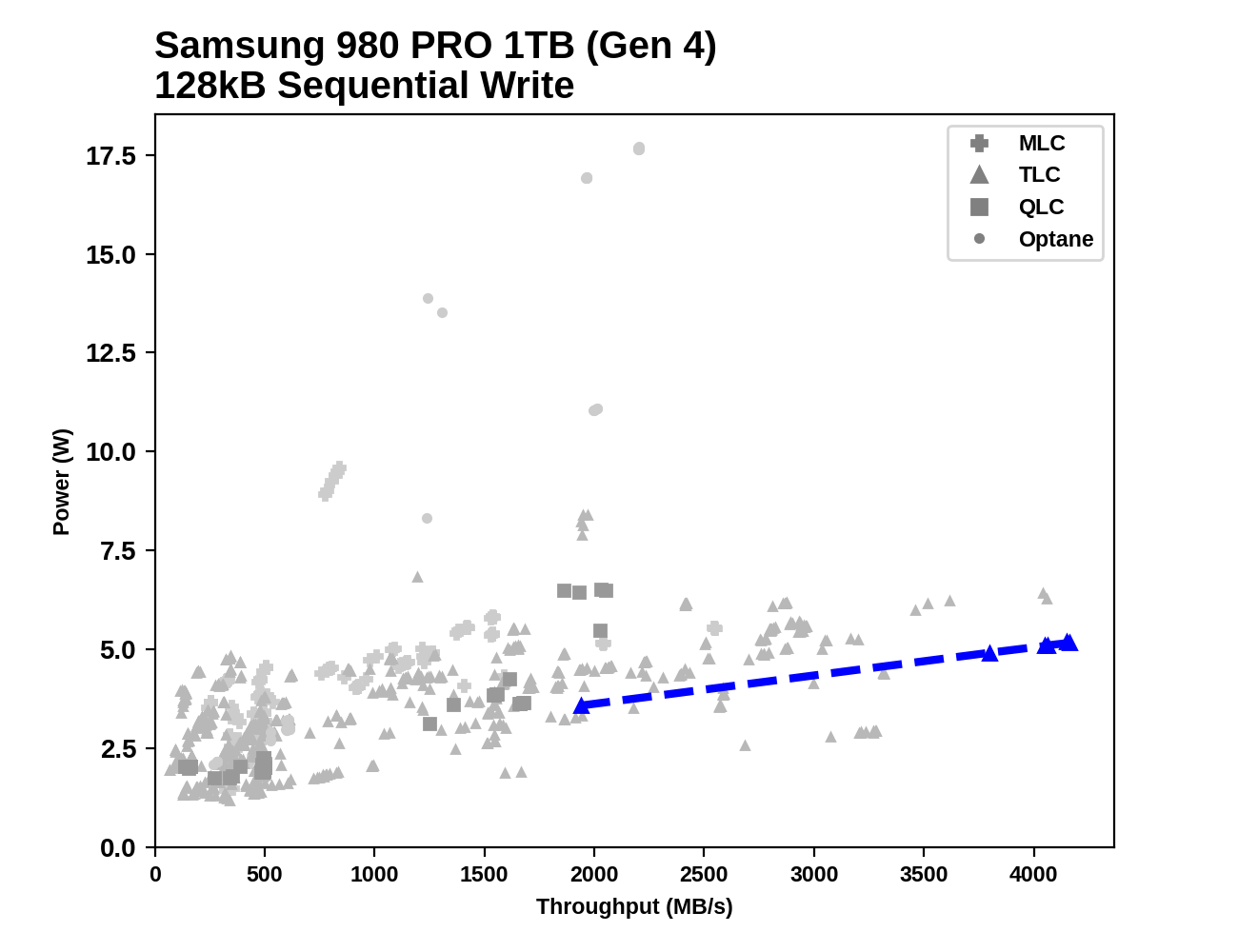








137 Comments
View All Comments
Billy Tallis - Thursday, September 24, 2020 - link
The reviewers guide indicated that Samsung plans to continue using the PRO/EVO/QVO branding, but they don't have any new EVO or QVO drives to announce at this time. That's part of why I expect the EVO to continue on as a more entry-level TLC tier, without switching to QLC.Luke212 - Wednesday, September 23, 2020 - link
Terrible release. No faster after all this time. And to be outclassed by E18 Phisonjtester - Wednesday, October 14, 2020 - link
how is it not faster when on most charts it's well above the last generation? Also, why is MLC going to matter when the 1tb MLC has the same endurance as a 2tb evo plus? So is there no point in anyone having a 970 pro, regardless of their use case?I can either have a 1tb 970 pro for $240 after various discounts and credits or I can have a 2tb 970 evo plus for $270 or a 1tb 980 pro for $190. So how to decide? I already have a 1tb 970 evo plus, but haven't built yet and want at least 2 or 3 samsung drives.
Tom Sunday - Wednesday, September 23, 2020 - link
I just recently purchased a pair of Samsung 2TB 970 EVO Plus NVMe's to basically upgrading my older PC. They are super fast at 3500 MB/s sequential read speed. Its particulary felt in the booting-up process for sure. I question the necessity of the 980 PRO PCIe 4.0 because how fast does one really needs to go. I would think that for a few seconds here and there it's not worth it to graduate up again to the 4.0 world.Oxford Guy - Thursday, September 24, 2020 - link
"I question the necessity of the 980 PRO PCIe 4.0 because how fast does one really needs to go."That's not the point here. The point here is that the "980 Pro" is an EVO masquerading as a Pro. As others have said, it's likely a maneuver to foist QLC junk as the "upgrade" to the EVO line.
Luckz - Thursday, September 24, 2020 - link
To validate your faster booting process claim, did you compare your "super fast 3500 MB/s sequential read speed" to a cheaper 2000 MB/s drive like an A2000, or merely to a HDD from ancient times? And if it's "a pair" and an "older PC", you're going to run out of PCIe lanes anyway, unless it's a reasonably beefy HEDT or you don't (really) need a graphics card.im.thatoneguy - Thursday, September 24, 2020 - link
Thank you for testing last 16GB stats. As someone who uses Nvme drives for offloading TBs of video footage at a time this is actually really helpful to my workflows.Any reason though why there are no Sabrent drives benchmarked? They seem to be the most popular and best selling on Amazon. Seems like a good test to see if they are a value or if they are just cheap.
Billy Tallis - Thursday, September 24, 2020 - link
Sabrent drives are mostly or all Phison reference designs, sometimes with a custom heatsink. So their Rocket and Rocket 4.0 are basically equivalent to the Seagate drives featured in this review.I do have the 8TB Sabrent Rocket Q, but paused testing of that to work on this review. The 8TB review will probably be my next one finished, but those big drives take a while to test.
clieuser - Sunday, September 27, 2020 - link
How fast the 980 pro with PCIE 3.0, not with PCIE 4.0?ballsystemlord - Tuesday, September 29, 2020 - link
Spelling error:"and thus having optimized products to go along with it has always been the case as new generations trump the told."
Excess "t":
"and thus having optimized products to go along with it has always been the case as new generations trump the old."
I'll read the rest when the benchmarks are completed.